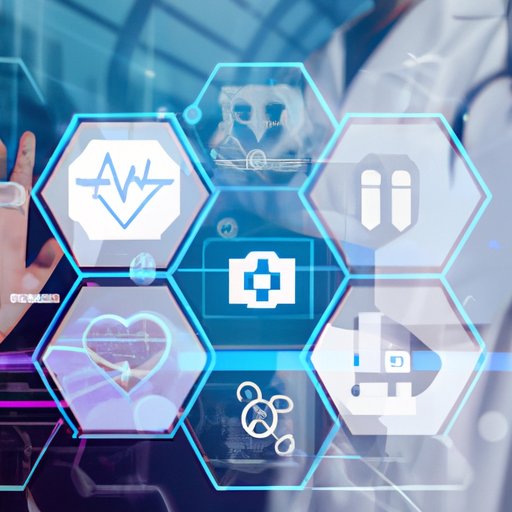Introduction
Healthcare technology is defined as the application of technology to the delivery of medical services and the management of healthcare systems. This includes the use of software, hardware, and other tools to improve communication, data storage, and patient care. In recent years, healthcare technology has become increasingly popular, with new technologies being developed at a rapid pace. In this article, we will explore the current trends in healthcare technology, the potential benefits and challenges associated with its use, and the innovative approaches that are being taken to improve patient care.
Benefits of Healthcare Technology
Healthcare technology is being used to improve patient care, increase efficiency, and reduce costs. According to a study published in the International Journal of Medical Informatics, “Adoption of medical informatics technologies has been found to be associated with improved quality of care, improved safety, and better patient outcomes.”
Improved patient care is one of the most significant benefits of healthcare technology. By integrating electronic health records (EHRs) into the healthcare system, physicians can access patient data more quickly and accurately, allowing for improved diagnosis and treatment. Additionally, telemedicine allows for remote consultations, making it easier for patients to receive care without having to travel to a physician’s office. Moreover, wearable medical devices enable doctors to monitor patients’ vital signs remotely and provide real-time feedback on their condition.
In addition to improving patient care, healthcare technology also increases efficiency. Automated processes such as computerized physician order entry (CPOE) help streamline workflow, reducing paperwork and eliminating errors. As a result, physicians have more time to devote to patient care. Furthermore, by utilizing data analysis, healthcare organizations can identify areas where they can improve operations and make better decisions.
Finally, healthcare technology can lead to cost savings. By reducing administrative costs and improving operational efficiency, healthcare organizations can save money. Additionally, through the use of telemedicine, patients can receive care without having to physically visit a doctor’s office, resulting in fewer trips to the hospital and lower costs for both patients and providers.
Challenges Facing Healthcare Technology
Despite the potential benefits of healthcare technology, there are several challenges that must be addressed. One of the biggest issues is accessibility. Many healthcare providers do not have the resources or expertise to implement and maintain sophisticated technologies, making it difficult for them to take advantage of the potential benefits. Additionally, many patients lack access to the internet or other technologies that are necessary for telemedicine or remote monitoring.
Another challenge facing healthcare technology is security concerns. The sensitive nature of patient data requires sophisticated security measures to protect against cyberattacks and data breaches. Additionally, healthcare organizations must ensure that their systems comply with regulatory requirements, such as the Health Insurance Portability and Accountability Act (HIPAA).
Finally, healthcare organizations must grapple with the ethical implications of using healthcare technology. For example, automated decision-making tools may lead to disparities in access to care if they are not properly designed and monitored. Additionally, the use of artificial intelligence (AI) raises questions about how decisions are made and who is accountable.
Innovations in Healthcare Technology
There are several innovative approaches that are being taken to improve patient care and reduce costs. Wearable medical devices are becoming increasingly popular, as they allow for continuous monitoring of vital signs and other health data. Additionally, telemedicine is becoming more widely used, allowing physicians to consult with patients remotely and providing access to care for those who may not otherwise have it.
Electronic health records are another area where healthcare technology is being used to improve patient care. EHRs allow physicians to store patient information in a secure, centralized system, making it easier to track patient history and diagnose conditions. Additionally, EHRs can be integrated with other systems, such as laboratory results and imaging studies, providing a comprehensive view of a patient’s health.
Artificial Intelligence and Healthcare Technology
Artificial intelligence (AI) is being used in healthcare to automate diagnostic tasks, deliver treatments, and interact with patients. AI-powered chatbots are being used to provide advice and answer questions, while automated systems are being utilized to detect diseases and recommend treatments. Additionally, AI is being used to analyze large amounts of data to identify patterns and offer insights into disease prevention and treatment.

Predictions for the Future of Healthcare Technology
Experts predict that the use of AI in healthcare will continue to grow in the coming years. AI will be used to automate more diagnostic tasks, such as diagnosing diseases and recommending treatments. Additionally, AI will be used to personalize care, as it will be able to tailor treatments based on an individual’s genetic makeup, lifestyle, and medical history.
Furthermore, experts predict that healthcare technology will lead to improved outcomes. With the use of AI and other technologies, healthcare providers will be able to detect diseases earlier and provide more accurate diagnoses. Additionally, remote monitoring and telemedicine will allow for earlier intervention and better management of chronic conditions.
Conclusion
Healthcare technology offers a variety of potential benefits, such as improved patient care, increased efficiency, and cost savings. However, there are also challenges that must be addressed, such as accessibility, security concerns, and regulatory compliance. Innovations such as wearable medical devices, telemedicine, and electronic health records are making it easier for healthcare providers to provide better care. Additionally, AI is being used to automate diagnostic tasks, deliver treatments, and interact with patients. Experts predict that the use of AI in healthcare will continue to grow in the coming years, leading to more personalized care and improved outcomes.
(Note: Is this article not meeting your expectations? Do you have knowledge or insights to share? Unlock new opportunities and expand your reach by joining our authors team. Click Registration to join us and share your expertise with our readers.)
